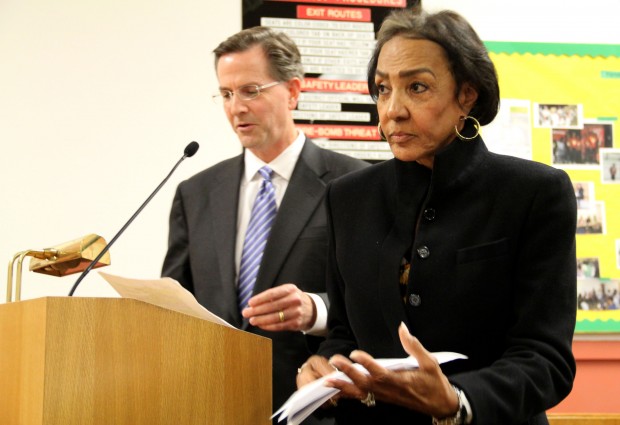
November 29, 2012
By Nausheen Husain
Administrators at the American Indian Model Schools—a set of three Oakland charter schools, two middle schools and one high school—responded late Monday night to a 1,080-page notice of violations given to them by the Oakland Unified School District, OUSD spokesperson Troy Flint said Wednesday.
School officials had been given until November 28 to respond to the district’s allegations regarding improper business contracts, inappropriate credit card usage and lack of school board meeting documentation, but filed their response two days early. If the response does not appropriately answer the questions posed by OUSD school board members about the schools’ finances and organization, the district could decide to revoke the schools’ charters.
The response will be summarized and released to the public after the Oakland school board members read it and remove confidential information, such as student or employee names, Flint said. “It was a long response. It filled up many binders,” Flint said. “The board will have some guidance from our legal team, but they will ultimately decide the fate of AIMS, whether the schools will remain open and in what capacity.”
AIMS operates three charter schools in Oakland: American Indian Public Charter School, American Indian Public High School and American Indian Public Charter School II. The schools reported a total enrollment of almost 500 students during the 2010-2011 school year; in that year, reports to the California Department of Education indicated that almost 70 percent of the students were Asian, 18 percent were Hispanic and 1 percent were American Indian. For the past few years, the schools have had consistently high Academic Performance Index scores, which measure a school’s yearly progress and determine federal funding. During the 2009-2010 school year, American Indian Public Charter School had an API of 988, the highest of all the schools in the state.
The district’s review of the school’s operations began in 2011, when it was given information from a confidential source regarding “improper financial dealings” at the AIMS schools, Flint said. Early this year, the Alameda County Office of Education requested that the Fiscal Crisis and Management Assistance Team (FCMAT) audit the AIMS schools. The audit was released this June. According to the audit, the study team found evidence of problems, including conflicts of interest in awarding school contracts, inappropriate credit card charges made by school officials, and a lack of documentation for decisions made by the schools’ board members in their meetings.
This September, the district issued a “notice of violations” to the schools based on that audit, as well as public records and previous correspondence between OUSD and AIMS board members. The AIMS administration was given 60 days to provide documentation that the FCMAT auditors said had been missing when they compiled their June report. AIMS administration members were also required to provide a written response to the OUSD, including an explanation or defense against the notice’s accusations, and a plan for remedial measures. This is the written response the district has just received.
At a heavily-attended September 27 school board meeting, when OUSD formally gave AIMS the notice of violations, board members emphasized that the notice did not mean they would close the schools, something that concerned AIMS schools parents in attendance. But if this new AIMS response proves unsatisfactory, officials made clear, OUSD could begin the process of revoking the schools’ charters.
Some of the central allegations in the district’s notice focus on financial transactions involving Ben Chavis, the founder of two of the AIMS schools and the former director of all three. The notice asserts that Chavis and his wife, Marsha Amador, collected almost $4 million from contracts made between the AIMS schools and Chavis’ businesses, including lease agreements, storage agreements and construction contracts—upgrading restroom facilities in 2006 and 2007—for the schools.
According to the notice, though the AIMS school board approved the contracts, there is no indication that they were aware of the money Chavis and his spouse would make from their businesses, including Lumbee Holdings and American Delivery Systems. Since state laws prohibit public officials, officers and employees from engaging in a contract in which they have a financial interest, Chavis’ membership on the AIMS board and the AIMS contracts that financially benefited him appear to be conflicts of interest, according to the FCMAT audit report.
